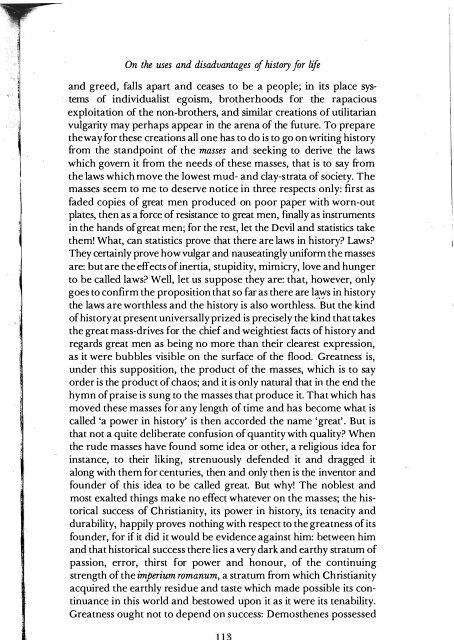Friedrich_Nietzsche - Untimely_Meditations_(Cambridge_Texts_in_the_History_of_Philosophy__1997)
Friedrich_Nietzsche - Untimely_Meditations_(Cambridge_Texts_in_the_History_of_Philosophy__1997)
Friedrich_Nietzsche - Untimely_Meditations_(Cambridge_Texts_in_the_History_of_Philosophy__1997)
Create successful ePaper yourself
Turn your PDF publications into a flip-book with our unique Google optimized e-Paper software.
On <strong>the</strong> uses and disadvantages . <strong>of</strong> history fo r lifeand greed, falls apart and ceases to be a people; <strong>in</strong> its place systems<strong>of</strong> <strong>in</strong>dividualist egoism, bro<strong>the</strong>rhoods for <strong>the</strong> rapaciousexploitation <strong>of</strong> <strong>the</strong> non-bro<strong>the</strong>rs, and similar creations <strong>of</strong> utilitarianvulgarity may perhaps appear <strong>in</strong> <strong>the</strong> arena <strong>of</strong> <strong>the</strong> fu ture. To prepare<strong>the</strong> way fo r <strong>the</strong>se creations all one has to do is to go on writ<strong>in</strong>g historyfr om <strong>the</strong> standpo<strong>in</strong>t <strong>of</strong> <strong>the</strong> masses and seek<strong>in</strong>g to derive <strong>the</strong> lawswhich govern it from <strong>the</strong> needs <strong>of</strong> <strong>the</strong>se masses, that is to say fr om<strong>the</strong>'laws which move <strong>the</strong> lowest mud- and clay-strata <strong>of</strong> society. Themasses seem to me to deserve notice <strong>in</strong> three respects only: first asfaded copies <strong>of</strong> great men produced on poor paper with worn-outplates, <strong>the</strong>n as a force <strong>of</strong> resistance to great men, f<strong>in</strong>ally as <strong>in</strong>struments<strong>in</strong> <strong>the</strong> hands <strong>of</strong> great men; for <strong>the</strong> rest, let <strong>the</strong> Devil and statistics take<strong>the</strong>m! What, can statistics prove that <strong>the</strong>re are laws <strong>in</strong> history? Laws?They certa<strong>in</strong>ly prove how vulgar and nauseat<strong>in</strong>gly uniform <strong>the</strong> massesare: but are <strong>the</strong> effects <strong>of</strong> <strong>in</strong>ertia, stupidity, mimicry, love and hungerto be called laws? Well, let us suppose <strong>the</strong>y are: that, however, onlygoes to confirm <strong>the</strong> proposition that so far as <strong>the</strong>re are ls <strong>in</strong> history<strong>the</strong> laws are worthless and <strong>the</strong> history is also worthless. But <strong>the</strong> k<strong>in</strong>d<strong>of</strong> history at present universally prized is precisely <strong>the</strong> k<strong>in</strong>d that takes<strong>the</strong> great mass-drives for <strong>the</strong> chief and weightiest facts <strong>of</strong> history andregards great men as be<strong>in</strong>g no more than <strong>the</strong>ir clearest expression,as it were bubbles visible on <strong>the</strong> surface <strong>of</strong> <strong>the</strong> flood. Greatness is,under this supposition, <strong>the</strong> product <strong>of</strong> <strong>the</strong> masses, which is to sayorder is <strong>the</strong> product <strong>of</strong> chaos; and it is only natural that <strong>in</strong> <strong>the</strong> end <strong>the</strong>hymn <strong>of</strong> praise is sung to <strong>the</strong> masses that produce it. That which hasmoved <strong>the</strong>se masses fo r any length <strong>of</strong> time and has become what iscalled 'a power <strong>in</strong> history' is <strong>the</strong>n accorded <strong>the</strong> name 'great' . But isthat not a quite deliberate confusion <strong>of</strong> quantity with quality? When<strong>the</strong> rude masses have found some idea or o<strong>the</strong>r, a religious idea fo r<strong>in</strong>stance, to <strong>the</strong>ir lik<strong>in</strong>g, strenuously defended it and dragged italong with <strong>the</strong>m for centuries, <strong>the</strong>n and only <strong>the</strong>n is <strong>the</strong> <strong>in</strong>ventor andfounder <strong>of</strong> this idea to be called great. But why! The noblest andmost exalted th<strong>in</strong>gs make no effect whatever on <strong>the</strong> masses; <strong>the</strong> historicalsuccess <strong>of</strong> Christianity, its power <strong>in</strong> history, its tenacity anddurability, happily proves noth<strong>in</strong>g with respect to <strong>the</strong> greatness <strong>of</strong> itsfo under, for if it did it would be evidence aga<strong>in</strong>st him: between himand that historical success <strong>the</strong>re lies a very dark and earthy stratum <strong>of</strong>passion, error, thirst for power and honour, <strong>of</strong> <strong>the</strong> cont<strong>in</strong>u<strong>in</strong>gstrength <strong>of</strong> <strong>the</strong> imperium romanum, a stratum from which Christianityacquired <strong>the</strong> earthly residue and taste which made possible its cont<strong>in</strong>uance<strong>in</strong> this world and bestowed upon it as it were its tenability.Greatness ought not to depend on success: Demos<strong>the</strong>nes possessed


